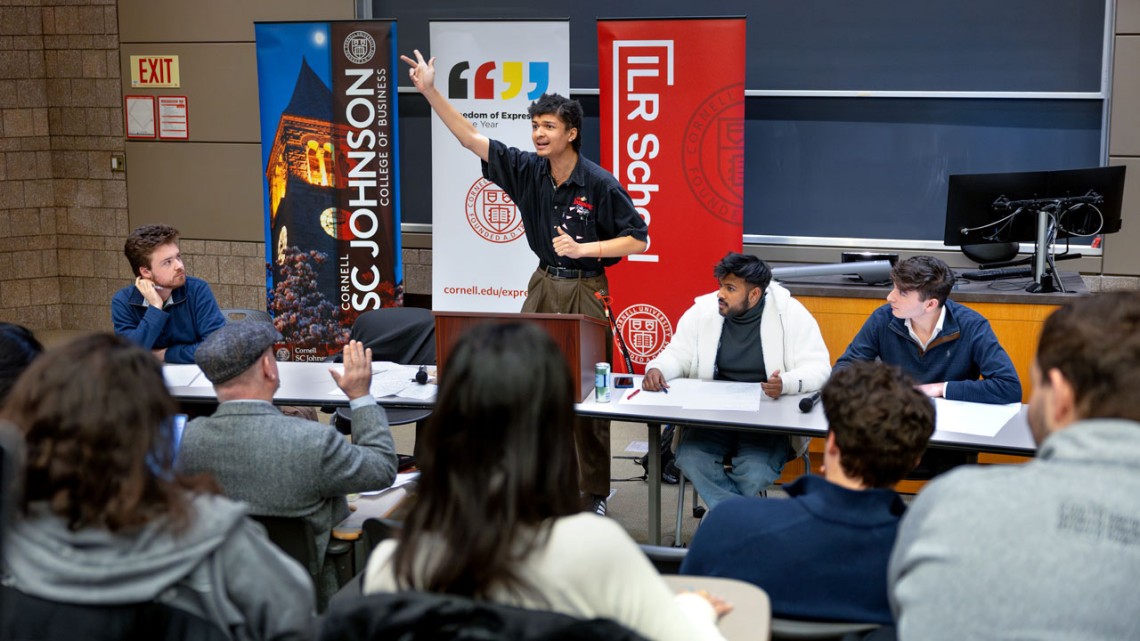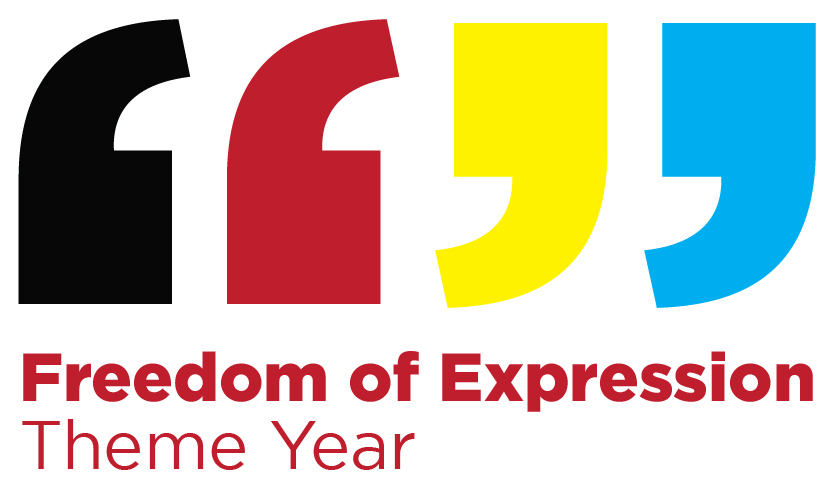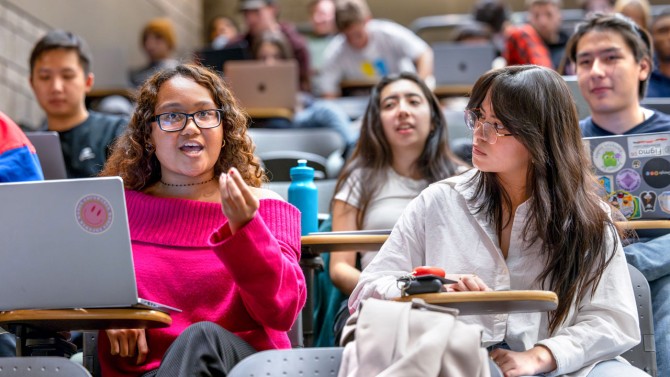
At the Feb. 7 debate, Leo Glasgow ’26 (standing) argues that freedom of expression is good for business.
Students debate freedom of expression’s impact on business
By Alison Fromme
Students sparred over whether promoting freedom of expression in the workplace drives innovation and improves business, or interferes with decision-making and results in gridlock, during a debate and discussion held Feb. 7 in Ives Hall.
Supporting Cornell’s Freedom of Expression theme year, the debate was the third in a series held by the Cornell Speech and Debate Program in collaboration with the ILR School’s Office of Engaged and Experiential Programs, the David M. Einhorn Center for Community Engagement and the Cornell SC Johnson College of Business.
Each team of two undergraduates was randomly assigned a position. Taking the affirmative side, Leo Glasgow ’26 and Eli Pallrand ’24 argued that the free exchange of ideas boosts innovation and hiring, and increases a company’s awareness of issues before they become major problems – all of which helps business thrive.
In opposition, Praveen Gunendran ’24 and Benjamin Casella ’27 argued that sharing ideas and opinions too freely can slow processes and create hostile conflicts between coworkers, which lowers morale and hurts business.
The lively debate inspired students, staff and alumni in the 65-person audience to knock on their desks in support as each side made various points. When polled at the end, most attendees said that the negative side made clearer arguments, but more people personally agreed with the affirmative side.
“I saw this debate as an opportunity for me to bring my business background to explore the topic,” said Gunendran, a student in the Charles H. Dyson School of Applied Economics and Management. “The landscape of business and the values it’s long stood for has been questioned in recent years, and I wanted to be a part of the shifting discourse about business practices.”
Glasgow, a China and Asia-Pacific studies major in the College of Arts and Sciences, noted that audience members came to the event with varying levels of familiarity with formal debate, and the feedback opened his eyes to how he might improve his skills.
“Debate is so much more than just speaking,” Glasgow said. “Debate highlights the importance of civil disagreement and conversation and lights up the very foundation of democracy.”
Following the debate, Sam Nelson, ILR School senior lecturer and director of the Cornell Speech and Debate Program, moderated a lengthy and spirited discussion. The audience weighed the relative importance of style versus content and considered how well each side directly addressed the other’s points. Several people noted that defining terms matters. What exactly does “freedom of expression” and “good for business” mean?
Nelson said some research shows that people watching a debate favor evidence supporting their existing beliefs. “Occasionally there are people open to changing their minds. Those are what we call critical thinkers, and that’s very much what we want Cornell University to produce,” he said.
The debate series was intended to model constructive disagreement. The first debate in the series on Jan. 31 asked, “Should Union Organizers Have Free Speech Rights in the Workplace?” and the second, held in Spanish on Feb. 5, asked, “¿Es Fomentar la Libertad de Expresión en el Lugar de Trabajo una Buena Práctica Empresarial?”
“These questions around voice, speech and expression in the workplace are central to our understanding of an increasingly shifting employment landscape,” said Ariel Avgar, the David M. Cohen Professor of Labor Relations and senior associate dean for outreach and sponsored research. “We need to get better at being able to disagree passionately and robustly, while at the same time engaging in dialog and discussion.”
Linda Barrington, associate dean for strategy and societal impact in SC Johnson, said the college frames the issue of freedom of expression in terms of the “marketplace of ideas.”
“In business, we care about well-functioning markets and effective organizations,” she said. “And you can’t have those without freedom of expression – and knowing where the boundaries are.”
Alison Fromme is a writer for the Cornell SC Johnson College of Business.
Media Contact
Adam Allington
Get Cornell news delivered right to your inbox.
Subscribe


